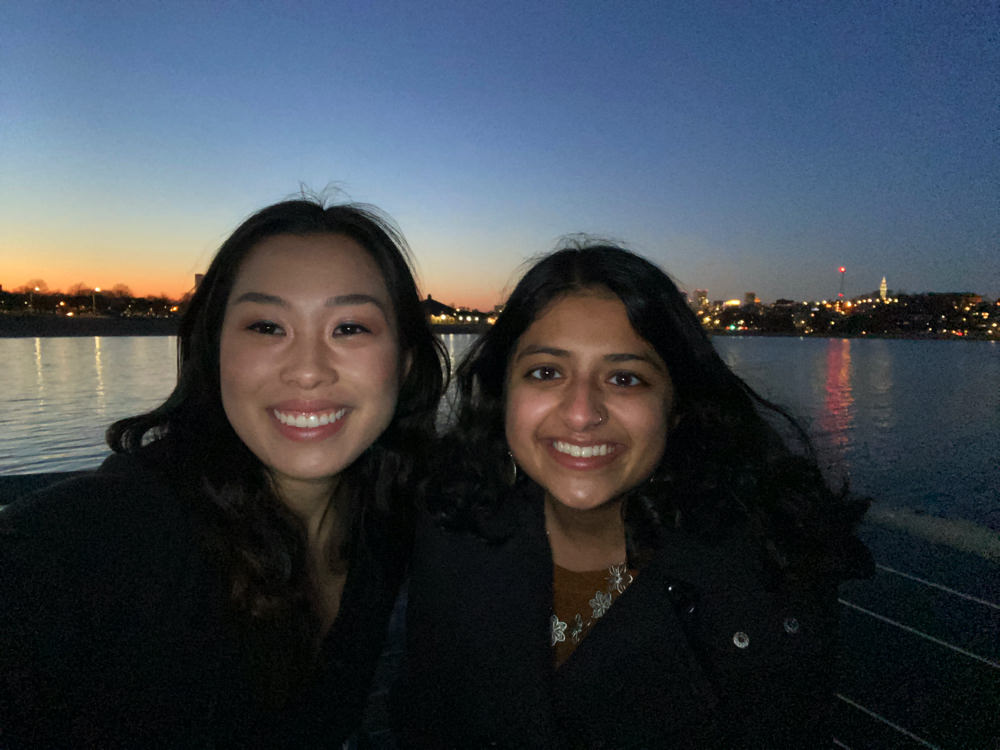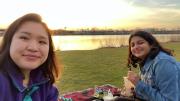I’m celebrating my virtual Commencement from Harvard while living on another college campus: Arizona State University. There’s a faint irony to driving around the Phoenix suburbs and seeing roadside maroon-and-gold banners congratulating the Sun Devil Class of 2021, when my own graduation from college is just days away. Already two weeks into a journalism internship in my home state of Arizona, I sometimes forget that the past four years have been defined by my identity as a Harvard student. My workdays—comprising a hybrid remote and in-person schedule—are now punctuated by running the dishwasher in my ASU sublet apartment and making frequent trips to the gas station.
Just days ago, I was still in Cambridge, living in Adams House and wrapping up my last semester as an undergraduate. But for the first time in college, I felt like more than just a student swallowed whole by an endless rotation of classes, office hours, and club meetings. This semester, I finally learned how to be a person at Harvard.
Despite the pandemic, it was a semester full of firsts: my inaugural strolls, runs, and picnics along the Charles River; my maiden visits—socially distanced—to the Museum of Fine Arts, the Arnold Arboretum, and the Mount Auburn Cemetery; my first day-trips to Brookline, Roxbury, and South Boston. I owe some of my exploration to senior spring: the inevitable feeling of levity that settles like a haze over the last few months of college, especially after senior theses are submitted in March. But in part, the pandemic itself offered me more free time: it extinguished the commute between classes and flattened the number of extracurricular meetings and social events that often exhaust weekday evenings. And by eliminating the dining hall as a mecca of social interaction, pandemic-era campus protocols allowed me to take my meals outdoors with friends, often in new locations. Throughout the semester, we took our prepackaged dining-hall food to Carson Beach and Magazine Beach for brown-bag picnics. “Grabbing a meal” took on a new meaning. And, this time, it actually happened.

Friends Meena and Patricia at Carson Beach in South Boston
Photograph courtesy of Meena Venkataramanan.
Inspired by an online January essay in which I lamented the inability to make new in-person friends during a pandemic, my neighbor across the hall knocked on my door in early February to introduce herself properly. She proposed we catch up over boba and a walk, and we quickly became good friends. She also introduced me to another senior from across the hall—and the three of us began to spend time together both on and off campus. During a Wellness Day halfway through the semester, we took a trip to the Museum of Fine Arts with two other seniors from the adjacent entryway. Prior to January, I hadn’t known any of them well—now, despite the cloistering nature of the pandemic, I found myself liberated by new friendships.
It was a novel feeling. I spent the first three-quarters of college exceedingly hesitant to venture beyond the confines of campus, afraid I’d miss out on an all-important club meeting or speaker event on a weeknight after classes. And on weekends, I balanced heaps of homework with on-campus social gatherings with friends. My daily routine was circumscribed by campus boundaries—in particular, the few buildings comprising the Barker Center, One Bow Street, and Adams House.
But this semester, I found myself making frequent trips on foot and by Harvard’s free on-demand van service to Central and Porter Squares—whether to grab coffee, ship a package, or pick up takeout. One weekend, I ventured to Central Square on Friday, Saturday, and Sunday, discovering a new restaurant, bookstore, or café during each 15-minute, eastbound stroll. My trips there, despite its proximity, felt refreshing, as if I were finally stepping out of the cocoon I’d spun for myself over four years.
On a Tuesday evening in late March, the House treated my entryway to a free UberEats dinner. One of my new friends and I decided on a whim to spend our $25 food credits at restaurants in Porter Square, to pick up takeout and return to our dorm in time for Zoom meetings previously scheduled. Within half an hour, we had vanned to Porter, grabbed our food, and vanned back—arriving within seconds of our Zoom meetings’ start. A few weeks later, we walked to Central to grab coffee on a Wednesday morning before classes. In previous semesters, I would never have envisioned peppering my hectic weekdays with impromptu trips off campus. Three-and-a-half years after moving to Cambridge, I was, at last, taking in the city beyond Harvard.
But this awakening wasn’t limited to my nonacademic activities. This spring, even my classes demanded thinking beyond the confines of campus. Having completed all my requirements, I spent my final semester taking drawing, acting, and fiction-writing classes that engaged my creative side. In class, I was often transported into another world, whether through assuming a new persona as an actor, birthing a fictional character on the page, or conjuring a scene from my imagination using charcoal or graphite. Instead of worrying about grades, I relished the carefree nature of these workshops and studios. It made attending class—even on Zoom—exhilarating.
And for the first time as an undergraduate, I audited a class at MIT. Even though I didn’t receive a grade or complete any formal assignments, I attended every lecture, wholly enthralled by the course topic: “South Asian America.” I was captivated by the layered histories of my predecessors in America, dating back to early-twentieth-century farm- and mill-workers who paved the way for future generations of South Asian immigrants who would span the country’s vast breadth. It was a kind of American history that I’d never had the opportunity to learn in a class before, with impacts I could feel pulsing deep inside me.
MIT’s calendar ran a few weeks behind Harvard’s, so I attended my last undergraduate class in mid May, when I logged on to the final Zoom meeting of “South Asian America.” By then, I had already moved to the Phoenix area and begun my internship. On the Tuesday evening of our last session, the students—each of us a child of South Asian immigrants—shared oral histories we’d conducted with our parents, chronicling their first days in America. The stories were moving, and sometimes heartbreaking. Most importantly, they pushed the boundaries of what it meant to be South Asian American—and, in encouraging introspection, urged us to consider who we are as individuals, beyond the classroom.
I spent that Tuesday evening attending a virtual history class at MIT, living at ASU, and on the cusp of graduating from Harvard. But despite the MIT course’s focus on history—often defined as the study of the past—in these waning days of being an undergraduate, I feel myself looking ahead, propelled both by my newfound contemplation of my own identity and my thirst for exploring my surroundings. For that, I have my final semester at Harvard to thank.









